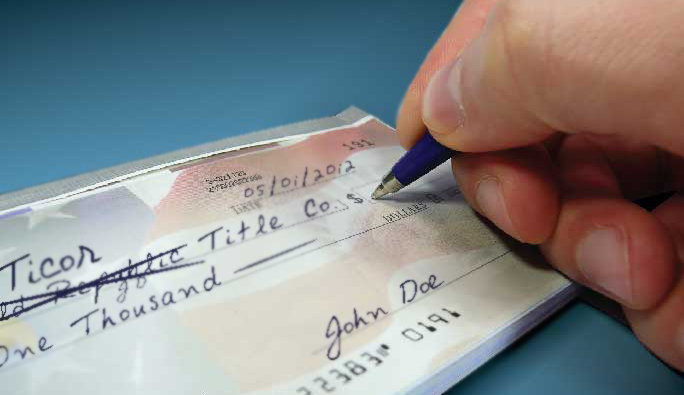Settlement agents are regularly pressured into accepting altered checks (which they should not) for earnest money. This usually occurs when the buyer’s original offer to the seller indicates one escrow company and then, somewhere in the negotiations, the principals agree on another escrow company. Real estate agents do not want to go back and ask their buyer for a new check, so instead the check is altered and the buyer initials the changes. Accepting the check is done at the sole risk of the operation. In this story, our office accepted an altered check which proved to be risky.
The original check is altered
One of our sister offices received a fully executed Purchase and Sale Agreement, along with a personal check representing the earnest money. Per the agreement, the amount of earnest money due was $1,000. The check was originally written to Old Republic Title Co., but during negotiations the principals agreed to change the escrow and title company to ours. Rather than obtain a new check for $1,000, the buyer simply crossed through the original payee, wrote in our company name and initialed the change.
Transaction is cancelled
Earnest Money refund is requested
The settlement agent receipted-in the funds and began to process the transaction. About a month later the buyer decided he wanted to cancel the transaction. His real estate agent instructed the settlement agent to prepare cancellation instructions reflecting the earnest money as being refunded to the buyer. The settlement agent prepared the cancellation instructions and sent them to the listing agent.
At first, the seller was not sure they were willing to give the money back to the buyer. The real estate agents began negotiating for their respective clients. In the meantime, the buyer went to his bank, Wells Fargo, and tried to place a stop payment on his earnest money check. When the request was denied, he filed an Affidavit of Forgery, claiming the check was altered and cashed without his approval.
Earnest Money “refunded” twice
Simultaneously, the sellers signed mutual cancellation instructions agreeing to return the earnest money to the buyer. The settlement agent cut a check from the trust account to the buyer, representing the refund of the earnest money. The buyer deposited the refund into his account at Wells Fargo.
Shortly thereafter, our Operational Accounting Center (OAC) received notice from Bank of America that our trust account was debited $1,000 based on the fact the original earnest money check was altered. When a fraud report is filed, banks act quickly to freeze the amounts in question while they determine the merits of the report. Wells Fargo immediately contacted our bank, Bank of America, who reviewed the affidavit.
The risk of accepting altered checks
Anytime a settlement agent accepts an altered check, he or she subjects the instrument to questioning. As a matter of fact, accepting an altered or endorsed check is done solely at the operation’s own risk, since the banking agreements Our Company enters into offer no protection for these checks. The operation is on their own to prove they were entitled to negotiate the check.
Accepting an altered or endorsed check is done solely at the operation’s own risk…
The OAC quickly found this out. They contacted Bank of America upon receipt of the notice our account was debited. Bank of America referred back to the banking agreement. Neither Bank of America nor Wells Fargo would provide assistance since the office accepted and negotiated an altered check – even though they had already refunded the buyer their earnest money deposit.
The OAC filed an Affidavit of Claimant on the refund check disbursed to the buyer. The basis for the affidavit was the fact that the borrower had already collected the original earnest money deposit. The claim was denied.
The Borrower withdraws Affidavit of Forgery
Next the settlement agent contacted the buyer’s real estate agent. She explained the borrower needed to withdraw their Affidavit of Forgery since he had received his refund. The borrower finally withdrew it and their account received credit for the original deposit. Whew! All of this work for a $1,000 deposit on a cancelled transaction for which we will never be paid!
The Moral of the Story
When Our Company opens a trust account, a banking agreement is signed which outlines the bank’s and Our Company’s responsibilities. One of our responsibilities is to accept checks made payable to Our Company only. If an office deviates from the agreement and accepts a third-party-endorsed or altered check, the bank has no obligation to assist or defend them; which is exactly what occurred in this instance. Settlement agents should be aware of the risks when accepting personal checks which have been altered or endorsed, and request a replacement check.
